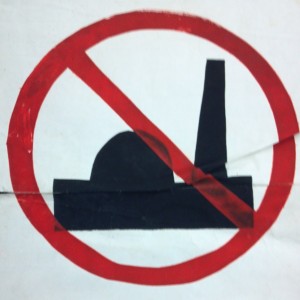During a long career of anti-nuclear power advocacy, from the late 1950s to the early 1990s, Larry Bogart—and his associates after him—gathered together and distributed an enormous collection of information on the hazards of nuclear power. Today the archive serves as a chronicle of the struggle against nuclear power and its grass roots origins. The collection is comprised of 42 boxes, amounting to approximately 54 linear feet, and covers approximately 50 years of time, spanning even after Larry Bogart’s death in 1991. In its extent it is more than a life’s work, and now, after a period of about three months of careful work, I am glad to report is completely inventoried!
The collection is comprised of anti-nuclear power publications from many different nationwide organizations—including his own, such as Nuclear Opponents and Energy News Digest—which show his concern for the nationwide problem, rather than merely local concerns. As can be surmised from the vast quantity of newspaper clippings, though, he devoted much attention to stopping power plants in the Northeast, such as Indian Point in New York, Vermont Yankee, and Seabrook in New Hampshire. His correspondence, though rarer, further indicates a deep devotion to the fight against nuclear power—since it is very nearly the only subject discussed—and correspondence written to him at his various organizations such as the Citizens Energy Council, Friends of the Hudson and the Anti-Pollution League—often requests for information or subscriptions to publications—shows his great importance within this advocacy movement.
The Larry Bogart Papers, rather than a direct biography of Larry Bogart, provides students and researchers with ample source materials for studying the movement as well as the specific concerns of scientists and citizens in the early era of nuclear power. Larry Bogart brought countless clippings and publications into one place from people and organizations from around the world, giving us a collection with a very wide scope. What the collection offers is greater than one person could have produced singlehandedly: a chronicle of fifty years of anti-nuclear advocacy, told in many voices.
Daniel Allie, undergraduate student employee

